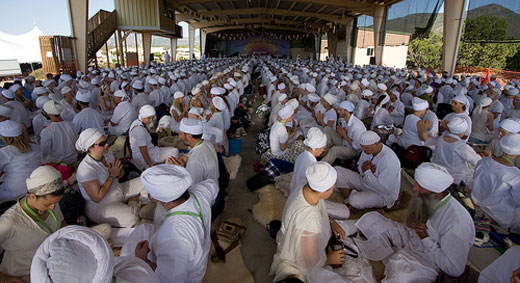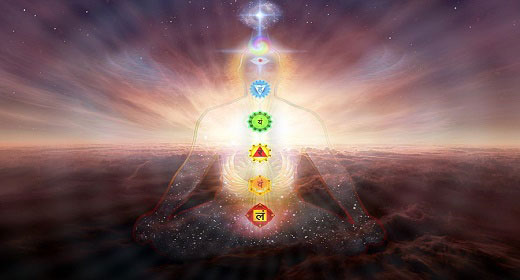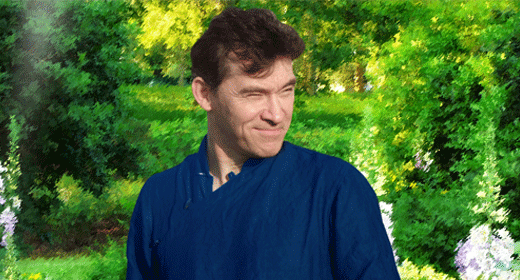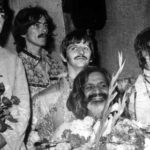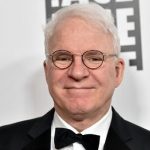by Peter Haldeman: “If you’re going to be a leader, you’re going to have to have a very loose relationship with this thing you call ‘I’ or ‘me,’” Werner shouted.
“Maybe that whole thing in me around which the universe revolves isn’t so central!”
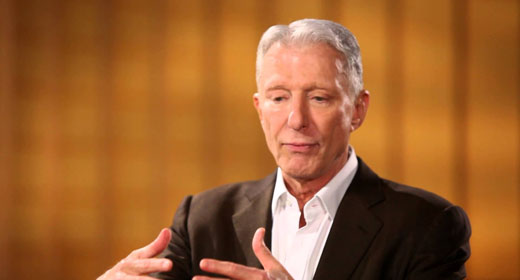
He paused to wipe his brow with a wad of paper towels. An assistant stood by with a microphone, but he waved her off. “Maybe life is not about the self but about self-transcendence! You got a problem with that?”
No one in the room had a problem with that. The desks were occupied by 27 name-tagged academics from around the world. And in the course of the day, a number of them would take the mike to pose what their instructor referred to as “yeah buts, how ’bouts or what ifs” in response to his pronouncements — but no one had a problem with them.
In some ways, the three-day workshop, “Creating Class Leaders,” recalled an EST training session. As with that cultural touchstone of the 1970s, there was “sharing” and applause. There were confrontations and hugs. Gnomic declarations hovered in the air like mist: “We need to distinguish distinction”; “There’s no seeing, there’s only the seer”; “There isn’t any is.”
But the event was much more civilized than EST. There were bathroom breaks. No one was called an expletive by the teacher.
This is significant because the teacher was none other than the creator of EST, Werner Erhard.
Pound another nail into the coffin for F. Scott Fitzgerald’s notion that there are no second acts in American lives.
“I am committed to the opposite of that idea,” Mr. Erhard said a few weeks after the leadership class in Toronto. “I don’t think there’s a person who walked out of that room who isn’t a second act.” To say nothing of their instructor, who, at age 80, may be more of a third or fourth act.
There was a time, boys and girls — the Me Decade, Tom Wolfe called it — when Mom and Dad wore mood rings, attended encounter groups and in general engaged in a tireless amount of navel gazing. If the so-called human potential movement had a single avatar, it was Werner Erhard.
EST (Latin for “is” and an acronym for Erhard Seminars Training) was equal parts Zen Buddhism and Dale Carnegie. Aspiring “ESTies” flocked to hotel ballrooms across the country for combative training sessions during which they forwent meal and bathroom breaks to take responsibility for their lives and “get it” by discovering there was nothing to get.
Diana Ross, Joe Namath, Yoko Ono, Jerry Rubin and several hundred thousand other seekers got it. Newsweek anointed Mr. Erhard “a celebrity guru who retails enlightenment.” There were doubters. To New Times magazine, he was “the king of the brain snatchers.”
The criticism intensified as EST grew. It was labeled a cult that practiced mind control (verbal abuse, sleep deprivation), a racket that exploited its followers (heavy recruiting, endless “graduate seminars”).
Much was made of Mr. Erhard’s tangled Don Draperish past: his days as a car salesman in Philadelphia, his dabbling in Mind Dynamics and Scientology, his desertion of his first wife and their four children to reinvent himself on the West Coast.

Even his name was fake, lifted from an Esquire article he read on the plane to California. (“The Men Who Made the New Germany” included references to Ludwig Erhard, the minister of economics, and Werner Heisenberg, the atomic scientist.) Mr. Erhard was born Jack Rosenberg.
In 1985, he repackaged EST as the Forum, a kinder, gentler iteration of the training that was also more success-oriented. “In the ’80s, people started to think a little bit, and it was possible to use a less-confrontational style,” he said. But tax disputes, company lawsuits and an ugly divorce from his second wife kept Mr. Erhard in the news media cross hairs.
The flameout came in 1991. In March of that year, at the same time that I.R.S. officials were publicly accusing him of tax fraud, “60 Minutes” broadcast a report on Mr. Erhard that depicted him as an abusive father and husband who had sexually molested two daughters from his second marriage. Shortly before that show was televised, he sold the Forum to a group of employees, gave his Great Dane to a friend and fled the country.
“My reputation was destroyed by ‘60 Minutes,’” Mr. Erhard shouted between sips of Dragon Well Supreme green tea and a fistful of the pills he takes for various ailments. (He has no indoor voice — a professional hazard, perhaps.)
He had taken a suite at the London NYC hotel, where he had traveled with his Dutch-born third wife, Gonneke Spits, from Toronto to see friends, do a little business and visit his favorite chiropractor and tailor. He was also in the city to meet with a reporter — virtually the only press he has done in more than two decades.
“It was clear that I had to remove myself from the work, or the work was going to get very damaged,” Mr. Erhard said of his self-imposed exile.
But it was the Church of Scientology that actually drove him out of the country. According to Mr. Erhard, the “60 Minutes” allegations were the culmination of a smear campaign organized by Scientology officials to get back at him for poaching clients and ideas.
“There’s no question that I was declared fair game by L. Ron Hubbard,” he said. “In the doctrines of Scientology, that meant they could destroy me financially, socially or reputationally.”
This was a long time before the book (and the movie) “Going Clear” exposed some of the shadier practices of Scientology. But a 1991 article in The Los Angeles Times described how the church had indeed targeted Mr. Erhard as a “suppressive person,” hiring at least three private investigators to dig up dirt on him and pass it on to the news media. One of them, Alan Clow, said he shared his findings with “60 Minutes.”
As for the I.R.S., Mr. Erhard sued the agency (winning $200,000 in damages) for falsely claiming he had evaded taxes.
The daughter who had accused him of abuse later recanted, admitting she had lied to receive an advance on a book. And an article in The Believer stated that the “60 Minutes” segment was riddled with so many discrepancies that CBS deleted it from its public archives.
After leaving the country, Mr. Erhard settled in a friend’s apartment in Tokyo, with, he said, no more than “a pocketful of cash” to his name.

He had kept the business rights to the Forum in Japan, and for several years, under the rubric of “mastery,” he conducted seminars for professionals coping with Japan’s financial crisis of the early 1990s. He also did some consulting work for Landmark, the Forum’s successor, run by his brother Harry Rosenberg.
In 1996, Mr. Erhard came down with a mysterious debilitating illness. A friend referred him to his doctor in the Cayman Islands, who ultimately diagnosed the Epstein-Barr virus. Mr. Erhard recovered on Grand Cayman, where he and Ms. Spits (a former EST executive) bought a villa in George Town, which remains their home base when they are not traveling.
For several years before his latest professional reincarnation, Mr. Erhard consulted for businesses and government agencies like the Russian adult-education program the Znaniye Society and a nonprofit organization supporting clergy in Ireland.
Enter the Harvard economist Michael Jensen. Dr. Jensen, who is famous in financial circles for championing the concepts of shareholder value and executive stock options, had taken a Landmark course in Boston at the suggestion of his daughter, who mended a rocky relationship with Dr. Jensen after taking the course herself.
“I became convinced we should work to get this kind of transformational material into the academies,” he said, adding that he considers Mr. Erhard “one of the great intellectuals of the century.”
In 2004, with the help of a Landmark official, Dr. Jensen developed an experiential course on integrity in leadership at the Simon Business School at the University of Rochester. The class was offered there for five years, with Mr. Erhard signing on as an instructor during its third year. It has since been taught at several universities around the world as well as at the United States Air Force Academy.
As far as its philosophical underpinnings go, Mr. Erhard struggled a bit to describe the course without resorting to its Delphic phraseology (“ontological pedagogy,” “action as a correlate of the occurring”).
Sitting in front of a bank of computers in his hotel room, he read excerpts from the 1,000-page textbook he is working on, such as: “As linguistic abstractions, leader and leadership create leader and leadership as realms of possibility in which, when you are being a leader, all possible ways of being are available to you.”
Briefly, the course, which owes ideological debts to the Forum and to the German philosopher Martin Heidegger, takes an experience-based, rather than knowledge-based, approach to its subject. Students master principles like integrity and authenticity in order to leave the class acting as leaders instead of merely knowing about leadership.
Its promoters believe the course has broader applications both within and outside of academia. “They should take it to government,” said Paul Fireman, the former chairman and C.E.O. of Reebok, who has consulted with Mr. Erhard on his recent work. (Mr. Fireman says that Reebok’s stock price jumped “from the $6 or $7 range to the $25 to $30 range” after he introduced his employees to the Landmark training.)
Landmark, for which Mr. Erhard continues to help develop new programs, is far more mainstream than EST ever became. Currently, according to Harry Rosenberg, 130,000 people a year participate in its offerings, which are available on every continent except Antarctica. It has a stronger corporate presence than EST or the Forum; in addition to Reebok, clients include Microsoft, NASA and Lululemon.
Still, Mr. Erhard’s emphasis on personal responsibility, on being rather than knowing, is embedded in the Landmark workshops. “All of the Landmark programs are based on the ideas and methodology that Werner developed,” Mr. Rosenberg said. “The basic intent has not changed.”

In fact, Mr. Erhard casts a fairly long shadow in the culture at large. His influence, wrote Lucy Kellaway in the Financial Times, “extends far beyond the couple of million people who have done his courses: there is hardly a self-help book or a management training programme that does not borrow some of his principles.”
Whether that’s a good thing or not probably depends on one’s attitude toward such books and programs.
“Erhard made palatable the notion that the end justifies the means,” said Steve Salerno, the author of “Sham: How the Self-Help Movement Made America Helpless.” “Which is partly responsible for the climate of what I call happyism. If your happiness is all that matters, anybody who stands in the way becomes detritus in the ruthless pursuit of individual perfection.”
Criticism of this sort does not faze Mr. Erhard. Certainly, he’s weathered worse.
In his ninth decade, he is consumed with his latest mission, putting in 10-hour days lecturing and teaching three courses a year in addition to completing the textbook.
His recent health challenges include a battle with septicemia that left him having to learn to walk again (a timer in his suite reminded him to stroll around every half-hour), but he still works six days a week.
While he writes, he listens to music: Renée Fleming, the Serbian composer Stevan Mokranjac, Sérgio Mendes. “You’re going to get a kick out of this,” he said, scrolling through the playlist on one of his computers. “Gonneke! Where’s ‘Brasileiro’ on here?”
His wife, a stylish platinum-haired woman whom Mr. Erhard leans on to negotiate the more mundane demands of life, helped him find the album by Mr. Mendes in question. The surdo-drum thumping of a batucada band filled the room.
In their downtime, the couple likes to travel. Tokyo, Amsterdam and London are favorite places, along with Hawaii and the West Coast, where Mr. Erhard’s seven children live. He now enjoys a very strong relationship with four of them, he said, and a good relationship with the other three.
He also has 11 grandchildren, and one of his current preoccupations is the numbing effects of digital technology on millennials. Warming to the subject, he read aloud another passage, this one from a dense Heidegger essay calling for a “comportment toward technology which expresses yes and at the same time no.”
”The cost to this generation is enormous,” Mr. Erhard said. “They are losing access to their humanity.”
Maintaining access to his own humanity may be Mr. Erhard’s biggest project. Floating around the screen of another computer was the word “impeccability,” a reminder, he said, “to deal with whatever I touch with care.” If he learned his lesson the hard way, maybe there is no easy way.
“Here’s how it is for me,” Mr. Erhard said, leaning in, giving his vocal cords a break. “When my integrity is lacking, I am clear that I just got to be a bit smaller as a person. And the thing you have to remember about integrity is it’s a mountain with no top.”
The clock chimed. He stood and stretched. Time for another few laps around the room.

